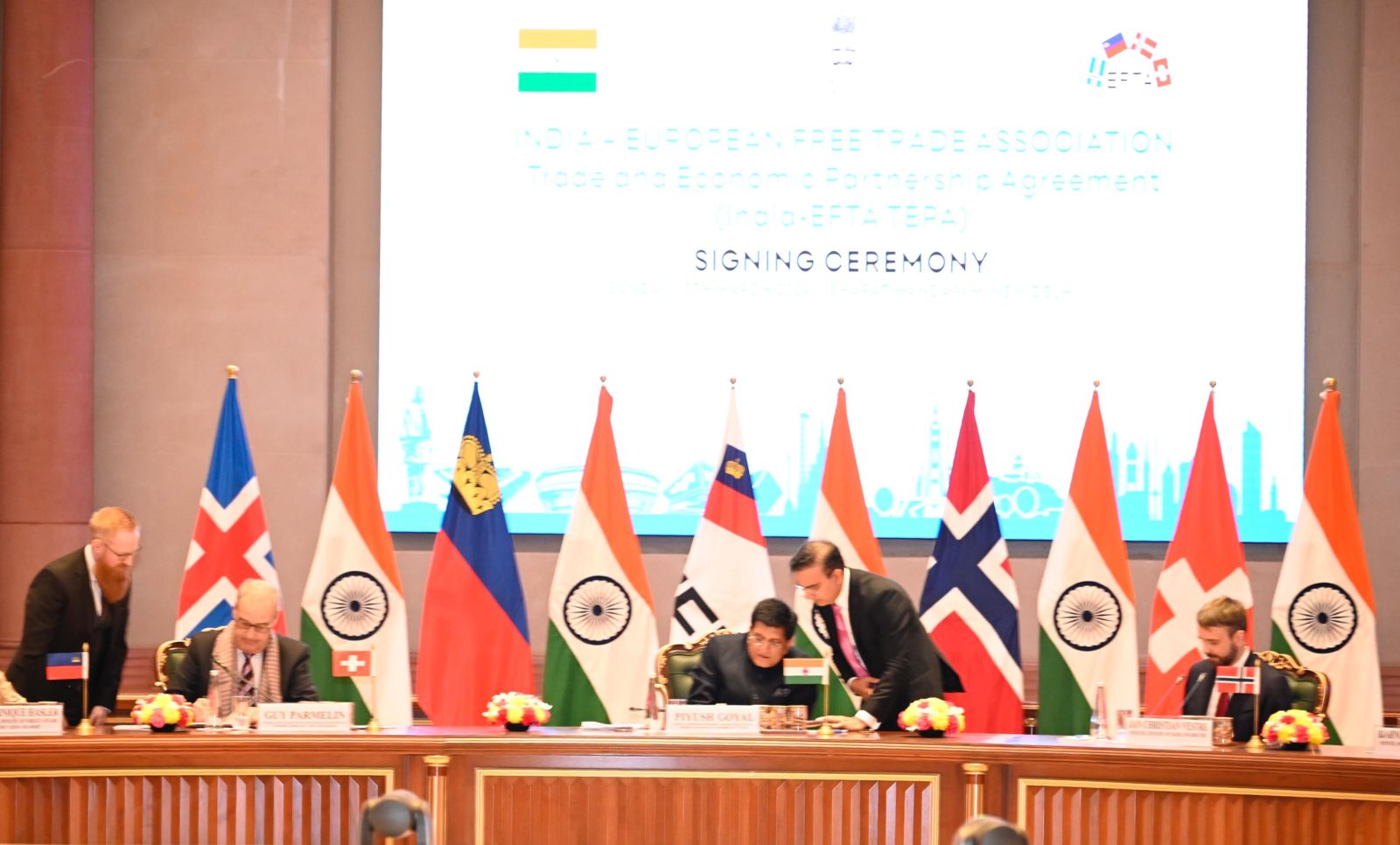THE NEWS FREEDOM
NEW DELHI, MARCH 10
India signed a landmark free trade agreement (FTA) valued at $100 billion with the European Free Trade Association (EFTA) on Sunday, marking a significant economic alliance. Commerce and Industry Minister Piyush Goyal hailed the Trade and Economic Partnership Agreement (TEPA) as a groundbreaking accord, securing a commitment of $100 billion in investments and the creation of 1 million jobs in India over 15 years.
“This agreement reflects a new paradigm in trade partnerships,” Goyal said while addressing the gathering. “The pact will boost India’s ‘Make in India’ initiative and offer unmatched opportunities for our young and skilled workforce. It will also open doors for Indian exporters to access wider European and global markets,” he said.
The Union Cabinet chaired by the Prime Minister has approved signing of the TEPA with EFTA States. EFTA is an inter-governmental organization set up in 1960 for the promotion of free trade and economic integration for the benefit of its four Member States.
The deal comes after extensive negotiations between India and EFTA, which comprises Switzerland, Iceland, Norway, and Liechtenstein. The Indian government approved the signing of TEPA with these nations. Formed in 1960, EFTA promotes free trade and economic integration among its members. The 14-chapter TEPA focuses on facilitating market access for goods, establishing rules of origin, streamlining trade processes, and addressing intellectual property rights.
EFTA presents significant opportunities for India to expand trade in goods and services. Switzerland is India’s biggest trading partner within the bloc, followed by Norway. This agreement signifies India’s strategic focus on building strong economic partnerships globally.
Highlights
- EFTA has committed to promote investments with the aim to increase the stock of foreign direct investments by USD 100 billion in India in the next 15 years, and to facilitate the generation of 1 million direct employment in India, through such investments. The investments do not cover foreign portfolio investment.
- For the first ever time in the history of FTAs, a legal commitment is being made about promoting target-oriented investment and creation of jobs.
- EFTA is offering 92.2% of its tariff lines which covers 99.6% of India’s exports. The EFTA’s market access offer covers 100% of non-agri products and tariff concession on Processed Agricultural Products (PAP).
- India is offering 82.7% of its tariff lines which covers 95.3% of EFTA exportsof which more than 80% import is Gold. The effective duty on Gold remains untouched. Sensitivity related to PLI in sectors such as pharma, medical devices & processed food etc. have been taken while extending offers. Sectors such as dairy, soya, coal and sensitive agricultural products are kept in exclusion list.
- India has offered 105 sub-sectors to the EFTA and secured commitments in 128 sub-sectors from Switzerland, 114 from Norway, 107 from Liechtenstein, and 110 from Iceland.
- TEPA would stimulate our services exports in sectors of our key strength / interest such as IT services, business services, personal, cultural, sporting and recreational services, other education services, audio-visual services etc.
- Services offers from EFTA include better access through digital delivery of Services (Mode 1), commercial presence (Mode 3) and improved commitments and certainty for entry and temporary stay of key personnel (Mode 4).
- TEPA has provisions for mutual recognition agreements in professional services like nursing, chartered accountants, architects etc.
- Commitments related to Intellectual Property Rights in TEPA are at TRIPS level. The IPR chapter with Switzerland, which has high standard for IPR,shows our robust IPR regime.India’s interests in generic medicines and concerns related to evergreening of patents have been fully addressed.
- India signals its commitment to Sustainable development, inclusive growth, social development and environmental protection
- Fosters transparency, efficiency, simplification, harmonization and consistency of trade procedures
- TEPA will empower our exporters access to specialized inputs and create a conducive trade and investment environment. This would boost exports of Indian made goods as well as provide opportunities for the services sector to access more markets.
- TEPA provides an opportunity to integrate into EU markets. Over 40% of Switzerland’s global services exports are to the EU. Indian companies can look to Switzerland as a base for extending its market reach to EU.
- TEPA will give impetus to “Make in India” and Atmanirbhar Bharat by encouraging domestic manufacturing in sectors such as Infrastructure and Connectivity, Manufacturing, Machinery, Pharmaceuticals, Chemicals, Food Processing, Transport and Logistics, Banking and Financial Services and Insurance.
- TEPA would accelerate creation of large number of direct jobs for India’s young aspirational workforce in next 15 years in India, including better facilities for vocational and technical training. TEPA also facilitates technology collaboration and access to world leading technologies in precision engineering, health sciences, renewable energy, Innovation and R&D.
Stronger Ties Inked!
Delighted to sign the India-EFTA Trade & Economic Partnership Agreement, yet another pact of progress for our nation.
This watershed agreement, realised under the guidance & leadership of PM @NarendraModi ji, marks the dawn of a new era of prosperity and… pic.twitter.com/4h6FKoVAIO
— Piyush Goyal (मोदी का परिवार) (@PiyushGoyal) March 10, 2024
Delighted by the signing of the India-EFTA Trade & Economic Partnership Agreement. This landmark pact underlines our commitment to boosting economic progress and create opportunities for our youth. The times ahead will bring more prosperity and mutual growth as we strengthen our… https://t.co/z40wurQn9M pic.twitter.com/i9vQM9jYAi
— Narendra Modi (@narendramodi) March 10, 2024
